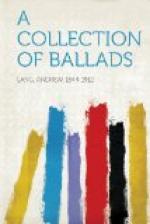“This is a mad blade,” the butchers then
said;
Saies the sheriff, “He is some prodigal,
That some land has sold for silver and gold,
And now he doth mean to spend all.
“Hast thou any horn beasts,” the sheriff
repli’d,
“Good fellow, to sell unto me?”
“Yes, that I have, good master sheriff,
I have hundreds two or three;
“And a hundred aker of good free land,
If you please it to see:
And Ile make you as good assurance of it,
As ever my father made me.”
The sheriff he saddled his good palfrey,
And, with three hundred pound in gold,
Away he went with bold Robin Hood,
His horned beasts to behold.
Away then the sheriff and Robin did ride,
To the forrest of merry Sherwood;
Then the sheriff did say, “God bless us this
day
From a man they call Robin Hood!”
But when a little farther they came,
Bold Robin he chanced to spy
A hundred head of good red deer,
Come tripping the sheriff full nigh.
“How like you my horn’d beasts, good master
sheriff?
They be fat and fair for to see;”
“I tell thee, good fellow, I would I were gone,
For I like not thy company.”
Then Robin set his horn to his mouth,
And blew but blasts three;
Then quickly anon there came Little John,
And all his company.
“What is your will, master?” then said
Little John,
“Good master come tell unto me;”
“I have brought hither the sheriff of Nottingham
This day to dine with thee.”
“He is welcome to me,” then said Little
John,
“I hope he will honestly pay;
I know he has gold, if it be but well told,
Will serve us to drink a whole day.”
Then Robin took his mantle from his back,
And laid it upon the ground:
And out of the sheriffs portmantle
He told three hundred pound.
Then Robin he brought him thorow the wood,
And set him on his dapple gray;
“O have me commanded to your wife at home;”
So Robin went laughing away.
NOTES
SIR PATRICK SPENS
Mr. Child finds the first published version of “the grand old ballad of Sir Patrick Spens,” as Coleridge calls it, in Bishop Percy’s Reliques. Here the name is “Spence,” and the middle rhyme--
“Haf owre, haf owre to Aberdour,”
is not of early date. The “Cork-heeled Shoon,” too, cannot be early, but ballads are subject, in oral tradition, to such modern interpolations. The verse about the ladies waiting vainly is anticipated in a popular song of the fourteenth century, on a defeat of the noblesse in Flanders—
“Their ladies them may abide in bower and hall well long!”
If there be historical foundation for the ballad, it is probably a blending of the voyage of Margaret, daughter of Alexander iii., to wed Eric, King of Norway, in 1281 (some of her escort were drowned on their way home), with the rather mysterious death, or disappearance, of Margaret’s daughter, “The Maid of Norway,” on her voyage to marry the son of Edward I., in 1290. A woman, who alleged that she was the Maid of Norway, was later burned at the stake. The great number and variety of versions sufficiently indicate the antiquity of this ballad, wherein exact history is not to be expected.




